- Home
- Various Authors
Sharing Christmas Page 3
Sharing Christmas Read online
Page 3
be it unto me according to thy word.”
“And the word was with God, and the
Word was God.” And the Word
was with Mary, and then with us.
And is ever with us.
Mary, given to pondering things
in her heart, emerges in strength and surety.
I, pondering things through the dimness
of blinded windows,
take heart in messages from angels
and the new voice of a woman transformed,
resounding through centuries of muffled hope:
“My soul doth magnify the Lord,
And my spirit hath rejoiced in God my Saviour.
For he hath regarded the low estate of his handmaiden;
for behold, from henceforth
all generations shall call me blessed.
For he that is mighty hath done to me great things;
and holy is his name.”
WHAT DO YOU MEAN, “NO ROOM”?
Elder Graham W. Doxey
The time had come for us to move back to the city, but we were not yet ready to sell our country home. Our four years there— sixteen wonderful seasons—had been packed with the aromas of fresh milk, alfalfa wet with new rain, burning logs, and hay in the barn. We had savoured the quietude, the distance between us and the rest of the busy world, which let us hear water peacefully murmuring in the canal, the milk cow grazing, the silence under the stars, the fingers of a breeze running down the keyboard of the dried corn stalks.
“Don't you dread the thoughts of winters in that high altitude?” a city friend asked. No, they are wonderful: a welcome relief from fighting the weeds of summer. What could be more beautiful than the flight of large snowflakes and the peace and wonder as you open the door after a heavy fall. Winter is glorious but, like many things in life, after a time the welcome grows thin. There comes a point when we look anxiously for green signs of the fresh new visitor: spring. Summer and fall each have their own glories. Our few years of feasting on these were not enough. We were not ready to cut our tethers to the country time of our lives.
The perfect solution was found when our married children wanted to have their turns in our log house in the country. Christmas traditionally brought the large and scattered family together, and for weeks my wife and four unmarried daughters and I looked forward with great anticipation to returning to the cosy house for this special family time. Although we were the parents and had always been the ‘hosts' at these affairs, this year we were to be guests. As we prepared for the event, planning food and gifts and accommodations, we began to appreciate the difference between the roles of ‘guest’ and ‘host.’ It became apparent that this year was going to be pleasantly different. We didn't remember that as one gives up responsibility one simultaneously gives up some control.
The snow was beautiful the night we arrived. Fourteen inches had collected on the driveway. We cut a track to the garage, which was at the rear of the house and set some distance away. The car had been fully packed, but the children were anxious to get into the warmth we could almost feel. The beckoning glow of light flowed from the windows of this home we all loved. My wife and I were left with far too many bundles to carry in one trip. Yet, standing in snow nearly to our knees, and being dusted as we were with the new fall, we found yet another finger to hold a string and a place to tuck yet another parcel so as to avoid a second trudging of the distance between the car and the back door.
With every other part of my anatomy dedicated to balancing my load, I tapped gently but anxiously on the door with my foot, hoping that someone would be close and would quickly open it for us. No response. I tapped again, a little less gently. No response. I called out as I pounded the next time. Silence from inside the house. From inside me, growing disturbance. Then my wife said, “What does that note on the door say?” I looked up, dripping a bit from the snow on my head, to see the words, “No Room in the Inn.” Someone, I thought, is trying to be clever, but it is not appropriate now. I pounded again and said in a loud and proprietary voice, “We have a heavy load and want to get into the house, now!” Silence. I asked where the children were who had just jumped out of the car, the ones who should have been carrying some of these things that were burdening me. We then realized that they hadn't gone through this door either; their tracks reversed and went back to the driveway and around the house to the front. That seemed ridiculous. I didn't want to do that. But my good wife had already started back through the snow, and I followed.
There was no path, only deep snow that was packing around my ankles and legs. We “broke trail” around to the front door.
Here was shelter from a covered porch, and a doorbell. We rang.
No response. The lights were on, but no one came. Only another piece of paper: “No Room in the Inn!” I rang a second time and called out loudly that we were cold and tired and burdened, and that we had read the cute message, but now it was time for them to open the door for us. Silence. I lowered the volume of my voice, but said so my wife could hear, “Whose house is this, anyway? Don't we still have some rights here?”
An anger and warmth was developing inside me that began to eclipse the discomforts of my cold body. If we couldn't get in the back door or the front door, what did they expect us to do? I seriously considered getting back into the car and heading for the city. I was not in the mood for these childish games.
There was yet another entrance, a sliding door to the family room from the patio. Again, tracks showed that our carefree children had gone before us. The quietude I had previously known in this spot was forgotten as my impatience and anger rose. How could the ones inside be so thoughtless of us and our miserable plight? As I waded again in the deep snow I knew that this year's Christmas reunion was going to be a bust. Bah, humbug!
At last the sliding door opened, and we stumbled through. I kept my face down, struggling to control my emotions so that I could be civil. Gradually I became aware that our family room was quite different. I first noticed the smell of hay; looking up I saw that there were hay bales where the furniture had been. In the corner were some of our grandchildren dressed as Mary and Joseph and lambs, our own live nativity scene. A real manger was set up. We saw young Mary holding her new baby. The children were excited but reverent. The hosts were warm, but a little apprehensive about having so rearranged our home. They made apologies about the inconvenience. I began to cool off as I warmed up to this occasion.
This was the Christmas when I first began to appreciate Joseph and Mary. I had truly felt the frustration of “no room!” Since then, as a parent, I have found ever-enlarging lessons in the stories of Mary and Joseph. Like them, I too have felt to flee to another place so that the evil forces would not destroy my child. Like them, I too have worried as my young teen has been away from me. I try now to look beyond the moment and see the wonder, the potential, the nobility in each of these eternal sons and daughters. I try harder to recognize times when I should be making “more room” for a Joseph who is full of real frustrations—times when I should be listening for, and opening up to receive, the Son of God.
CHRISTMAS TRADITIONS IN MEXICO
Elder Horacio A. Tenorio
Christmas celebrations were always very special, never-to-be-forgotten times during my early years. There are beautiful traditions in my homeland, Mexico, that have been passed on for many years and that create an environment of love and friendship.
Christmastime in Mexico begins on December 16 and ends January 6. During this time people remember the birth of Jesus Christ with different activities and with great joy.
The stage for the celebration is set by the Nacimiento (the birth), a display of figures made of wood, ceramic, or adobe representing shepherds, angels, the wise men, and the manger where Christ was born. This is beautifully decorated with landscapes such as small rivers, waterfalls, and sets of lights.
During the first nine days, from the sixteenth up to the twenty-fourth, a celebration called “Posada” (inn or place to stay) takes place every night. The Posadas represent the journey of Joseph and Mary to Bethlehem to be taxed. Every night during this journey they had to ask for a place to stay, or “posada,” in some of the homes they found along the way. Through the Posada this pilgrimage is represented.
To celebrate the Posadas, several families— relatives, friends, or neighbors—organize themselves so that during the course of the nine days each home will have the opportunity to receive the pilgrims. In some cities, neighbors get together and close off all the traffic on their block at night. They decorate the street from one sidewalk to the other with beautiful colored lights. Each host prepares a party for the guests during the assigned evening; in this way everyone has the opportunity to entertain the travelers.
The presentation is performed in the following manner: Two groups are organized; one group stays inside the house and the other stands in the street. The second group represents the pilgrims who accompany Mary and Joseph during their travel. Mary and Joseph are represented by two colorful, handmade adobe figures placed on a board. Each one of the pilgrims holds a little candle or lantern, and they come to the door and begin singing, asking for permission to come inside. Beautiful verses like the following are sung:
OUTSIDE GROUP
In the name of heaven
I ask for a place to stay
Because my dear wife
Is not able to walk.
INSIDE GROUP
This is not an inn
Go away.
I must not open
Lest you be some rascal.
OUTSIDE GROUP
Do not be insensitive.
Please, be merciful
Because the God in Heaven
Will surely reward you.
>
INSIDE GROUP
You can go away
Do not disturb anymore
Because if I get upset
I will beat you with a stick.
OUTSIDE GROUP
We come exhausted from Nazareth.
I am a carpenter, my name is Joseph.
My wife's name is Mary.
She has been anointed from heaven
And will be the mother
Of the Divine Word.
INSIDE GROUP
I do not care who you are
Let me sleep, please.
Again I tell you that we will not let you in.
Are you Joseph? Is your wife Mary?
Please, come inside, pilgrims
I did not know you.
OUTSIDE GROUP
May God pay you
For your great charity
And may the heavens bring
Great joy and happiness to all of you.
INSIDE GROUP
Blessed be the house that
Provides shelter in this day
To the pure virgin
Beautiful Mary.
The two groups sing alternating verses, and when they finish the doors are opened and the pilgrims are welcomed in. Once inside they sing again, this time together:
Come in, holy pilgrims, pilgrims
Receive this mansion.
Although it is a humble dwelling
I give it to you from my heart.
Now the party begins, and everyone sings:
Put candies and caneloni
For the boys who are too voracious
Neither do I want silver nor gold
What I do want is to break the piñata.
With this song the hosts begin to give little baskets with candies and caramel nuts to all present, and then they go to the back patio to break the piñata. The breaking of the piñata is a very special tradition. The piñata is made of a clay pot covered by different colored papers to give it the form of, for instance, a star, a clown, or perhaps an animal such as a donkey or an elephant. The figure is filled with fruits such as sugar cane, oranges, tangerines, limes, peanuts, tamarinds, and haws. When it is completely filled, it is hung from a wire or rope in the middle of the patio. Then the children take turns hitting the piñata with a stick about the size of a baseball bat. Their eyes must be covered with a piece of cloth and everyone else shouts, pretending to give directions to the person. This goes on until somebody finally hits the piñata, breaking it and spilling the fruits all over the floor. The children then run and happily try to get some fruit for themselves.
After the breaking of the piñata, the people sing Christmas carols, eat some snacks, and drink the traditional ponche, a hot beverage made of fruits such as apple, tamarind, haw, sugar cane, and a flower called jamaica. Sometimes this is followed by a dance for the adults.
The last Posada is on December 24, finishing earlier than the others so that the participants can go to their own homes for a more intimate family Christmas dinner.
On Christmas Eve, the entire family meets together to have the traditional meal of turkey, called guajolote in Mexico, codfish, romeritos (a native vegetable whose boiled leaves are served with shrimp and seasoned with chili) and mole (made of peanuts, chocolate, almonds, sesame seeds, toasted tortillas, and three different types of chili, among other things). This meal includes traditional Spanish candies, such as mazapan (almond paste), nougats, and candied almonds. That night children should eat and go to bed early because Santa Claus has to bring their toys and they must not be awake. During my childhood I would wake up early in the morning to see what happy surprises Santa Claus had brought me that year.
This is a time of great outpouring of love, brotherhood, and friendship among the people and more especially among the family. Asking for forgiveness and having good feelings and desires are also very important during this time.
On the evening of January 5 there is another get-together of family and close friends. On this special occasion people share the Rosca de Reyes (similar to a fruit cake but in the shape of a doughnut). This Rosca can be very large, according to the number of people present; sometimes it covers the whole table. It is served with hot chocolate. As they share this light but enjoyable dinner, people exchange good wishes for the new year. Another tradition is to hide one or more small ceramic figures in the dough when making the Rosca. The individual who gets the figure in his piece is supposed to have a party in his house the next month.
This Rosca de Reyes celebration commemorates the visit of the wise men from the Orient who went to see the newborn king, Jesus, in order to offer him their presents. On the morning of January 6, the children also receive some presents supposedly left by the holy men of the Orient. These are usually clothes or other useful items rather than toys.
The Tenorio family also enjoys some particular family traditions. On December 24 we have a special family home evening where we sing Christmas carols, read the scriptures (especially the story of Christ's birth), and reflect about this transcendent event for humankind. We share our testimonies and pray, expressing our gratitude for the coming of Christ to this earth and for the fact that he would come as a helpless child, after having been a king and God, in order to grow and develop so that he could experience the sufferings and sorrows that would enable us to obtain eternal salvation.
This is the most special evening of the entire year for us. We dress in our best, as if we were attending a sacrament meeting, because we feel we are inviting Jesus Christ to be with us. We indeed feel he is our guest of honor because we are celebrating the day of his birth. We always keep in mind that perhaps he might decide to personally visit us, accepting our invitation. In fact, I testify that there have been times when the Spirit of the Lord was truly present.
This is Christmas for us: a time of rejoicing, of celebrating, of sharing with family and friends, and most important a time of remembering the Savior Jesus Christ.
THE WONDROUS GIFT
President Spencer W. Kimball
Christmastime is a glorious time of happy friendliness and unselfish sacrifice; a time of increased hospitality, devotion, and love; a time of the subduing of selfish impulses; a time of renewing friendships, cementing loosening ties, and the swelling of the heart. It transcends the individual, the family, the community, the nation; it approaches the universal, crosses borders, and touches many nations of the earth. Our caroling voices sing the sweet songs of Christmas reminiscent somewhat of the host of heavenly angelic voices in the long ago, praising God and saying: “Glory to God in the highest, and on earth peace, good will toward men.”
We set up the evergreen tree with its gleaming, brightly colored lights; we hang wreaths and bells; and we light candles—all to remind us of that wondrous gift, the coming of our Lord into the world of mortality.
We send Christmas cards to numerous friends and relatives, pulling back into happy memories the loved ones who have moved out of our immediate association. Like the wise men who opened their treasury and presented to Jesus gifts of gold and frankincense and myrrh, we present to our loved ones things to eat and wear and enjoy.
Though we make an effort to follow the pattern of gift giving, sometimes our program becomes an exchange—gift given for gift expected. Never did the Savior give in expectation. I know of no case in his life in which there was an exchange. He was always the giver, seldom the recipient. Never did he give shoes, hose, or a vehicle; never did he give perfume, a shirt, or a fur wrap. His gifts were of such a nature that the recipient could hardly exchange or return the value. His gifts were rare ones: eyes to the blind, ears to the deaf, and legs to the lame; cleanliness to the unclean, wholeness to the infirm, and breath to the lifeless. His gifts were opportunity to the down- trodden, freedom to the oppressed, light in the darkness, forgiveness to the repentant, hope to the despairing. His friends gave him shelter, food, and love. He gave them of himself, his love, his service, his life. The wise men brought him gold and frankincense. He gave them and all their fellow mortals resurrection, salvation, and eternal life. We should strive to give as he gave. To give of oneself is a holy gift.
THE THREE SCROOGES
Lael Littke
Our whole family was surprised when Rula Mae declared that she wanted nothing for Christmas.

 Lady Ambleforth's Afternoon Adventure by Ann Lethbridge, Barbara Monajem, Annie Burrows, Elaine Golden, Julia Justiss and Louise Allen
Lady Ambleforth's Afternoon Adventure by Ann Lethbridge, Barbara Monajem, Annie Burrows, Elaine Golden, Julia Justiss and Louise Allen Gods & Mortals
Gods & Mortals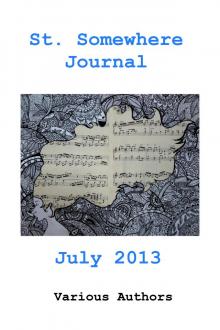 St. Somewhere Journal, July 2013
St. Somewhere Journal, July 2013 firstwriter.com First Short Story Anthology
firstwriter.com First Short Story Anthology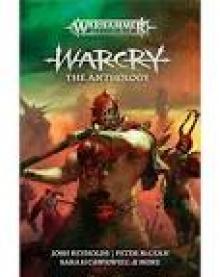 Warcry: The Anthology
Warcry: The Anthology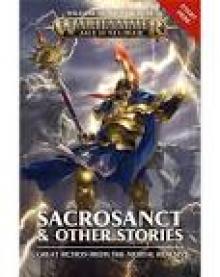 Sacrosanct & Other Stories
Sacrosanct & Other Stories Ultimate Heroes Collection
Ultimate Heroes Collection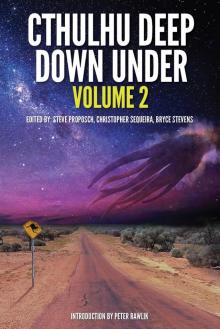 Cthulhu Deep Down Under Volume 2
Cthulhu Deep Down Under Volume 2 Erotic Classics II
Erotic Classics II Dynasties: The Elliotts, Books 1-6
Dynasties: The Elliotts, Books 1-6 Dynasties:The Elliots, Books 7-12
Dynasties:The Elliots, Books 7-12 International Speculative Fiction #4
International Speculative Fiction #4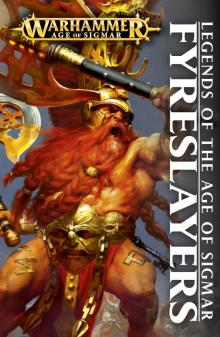 Fyreslayers
Fyreslayers One Night In Collection
One Night In Collection Mortal Crimes 2
Mortal Crimes 2 Some of the Best from Tor.com
Some of the Best from Tor.com Howl & Growl: A Paranormal Romance Boxed Set
Howl & Growl: A Paranormal Romance Boxed Set The Conan Compendium
The Conan Compendium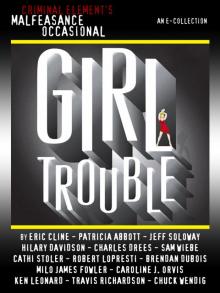 The Malfeasance Occasional
The Malfeasance Occasional Brides of Penhally Bay - Vol 4
Brides of Penhally Bay - Vol 4 Brides of Penhally Bay - Vol 2
Brides of Penhally Bay - Vol 2 Brides of Penhally Bay - Vol 1
Brides of Penhally Bay - Vol 1 School's in Session
School's in Session International Speculative Fiction #5
International Speculative Fiction #5 Erotic Classics I
Erotic Classics I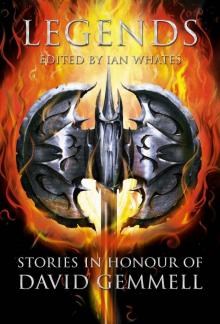 Legends: Stories in Honor of David Gemmell
Legends: Stories in Honor of David Gemmell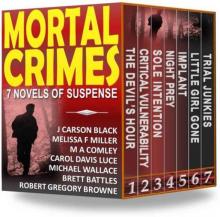 Mortal Crimes 1
Mortal Crimes 1 The Classic Children's Literature Collection: 39 Classic Novels
The Classic Children's Literature Collection: 39 Classic Novels Don't Read in the Closet volume one
Don't Read in the Closet volume one Some of the Best from Tor.com: 2014: A Tor.Com Original
Some of the Best from Tor.com: 2014: A Tor.Com Original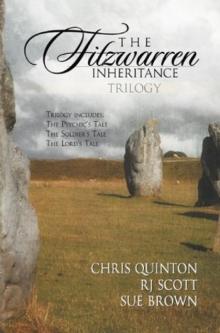 The Fitzwarren Inheritance
The Fitzwarren Inheritance All Things Zombie: Chronology of the Apocalypse
All Things Zombie: Chronology of the Apocalypse Hammer and Bolter - Issue 12
Hammer and Bolter - Issue 12 Kiss Kiss
Kiss Kiss Dog Stories
Dog Stories Bad Blood Collection
Bad Blood Collection